Unit 4 I used to be afraid of the dark. 汉译英 专练(含解析)人教新目标(Go for it)版 英语九年级上册
文档属性
| 名称 | Unit 4 I used to be afraid of the dark. 汉译英 专练(含解析)人教新目标(Go for it)版 英语九年级上册 | 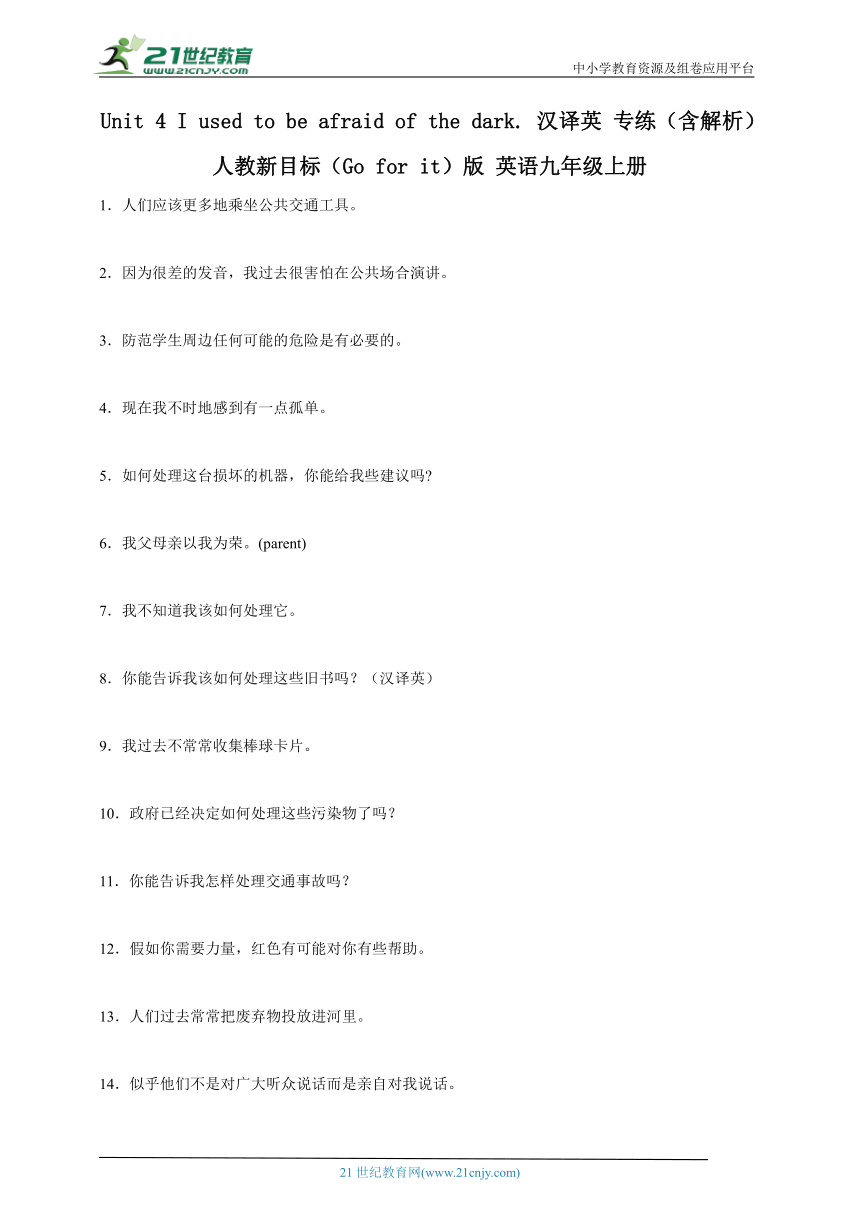 | |
| 格式 | docx | ||
| 文件大小 | 287.6KB | ||
| 资源类型 | 试卷 | ||
| 版本资源 | 人教新目标(Go for it)版 | ||
| 科目 | 英语 | ||
| 更新时间 | 2023-10-14 09:46:57 | ||
图片预览

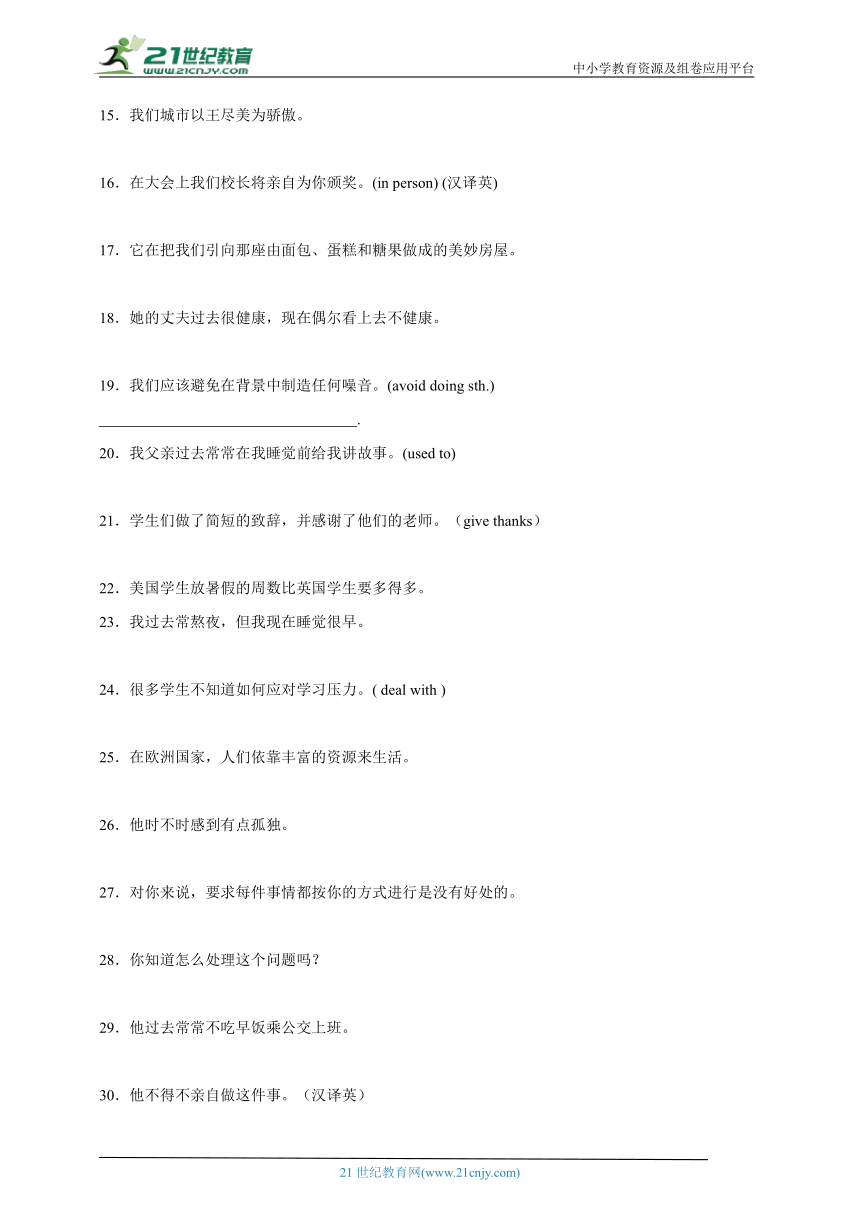
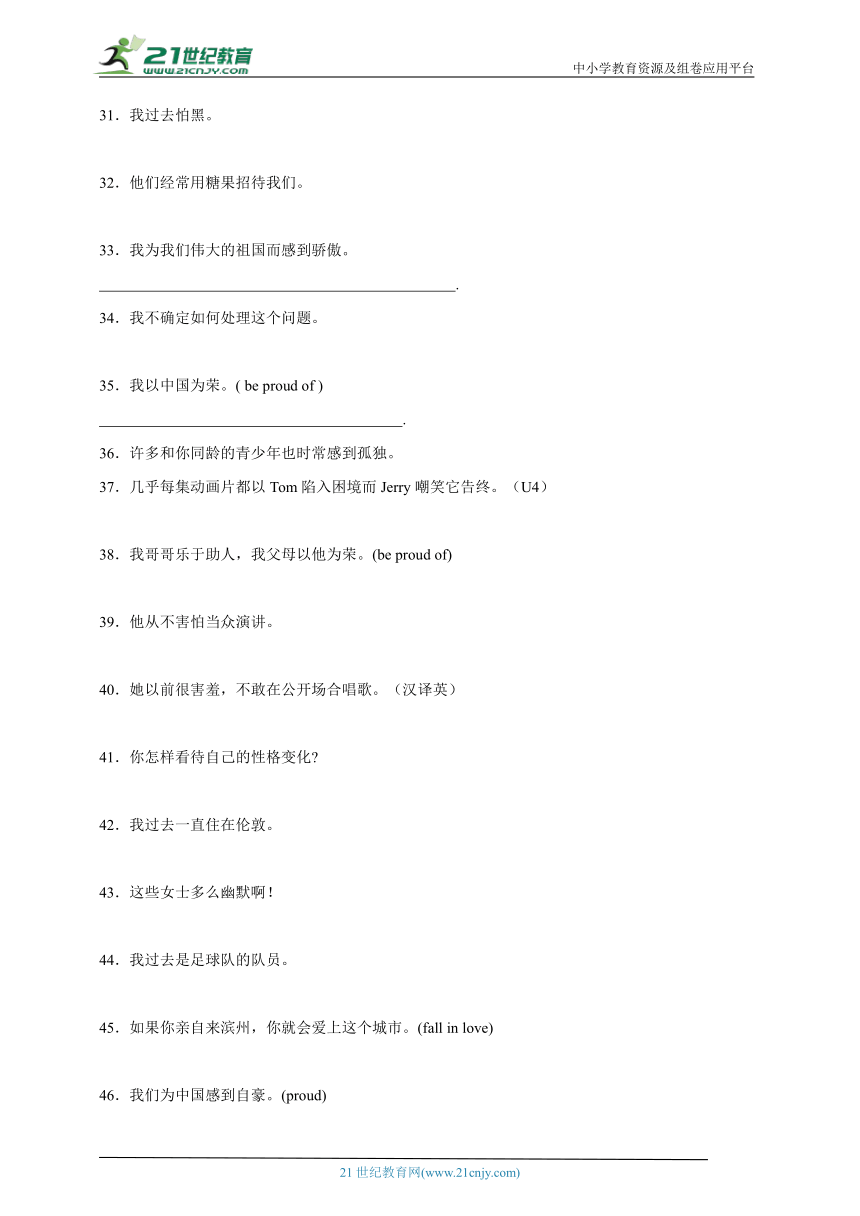
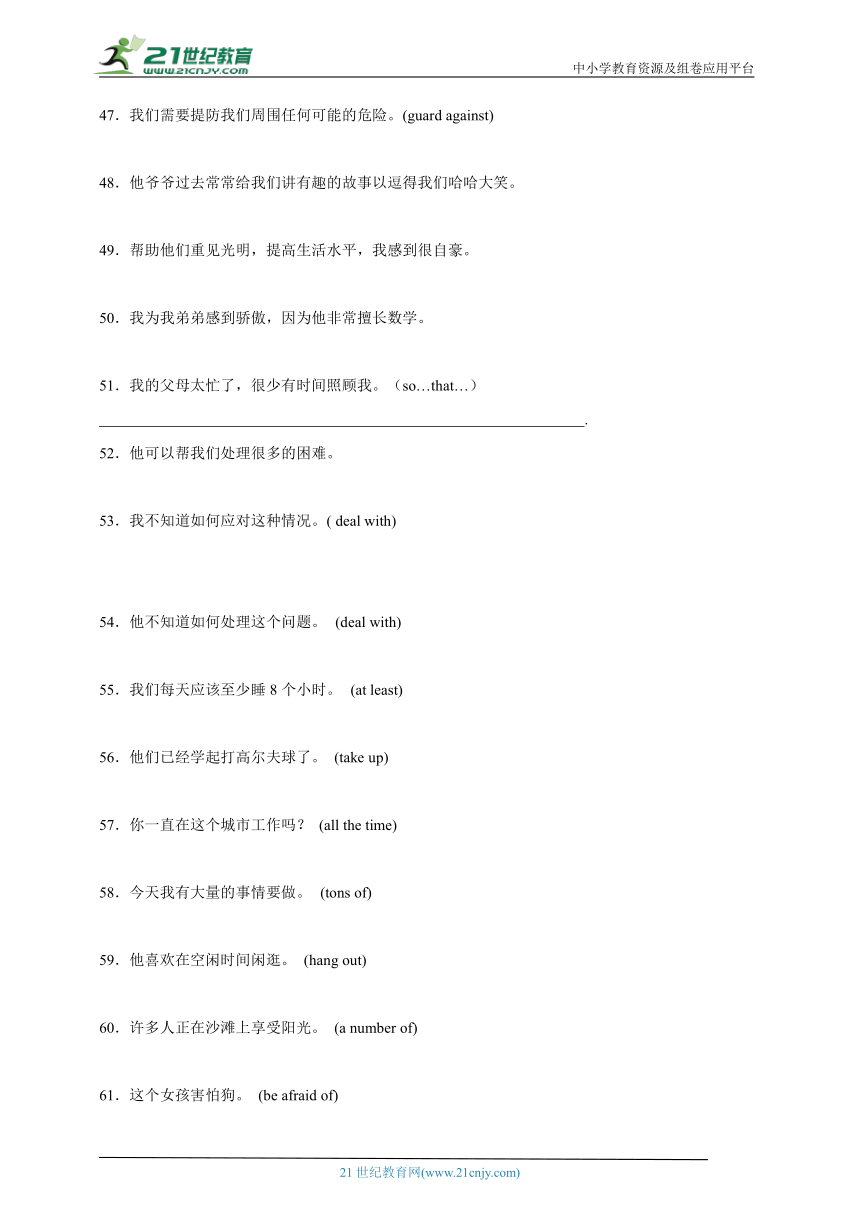
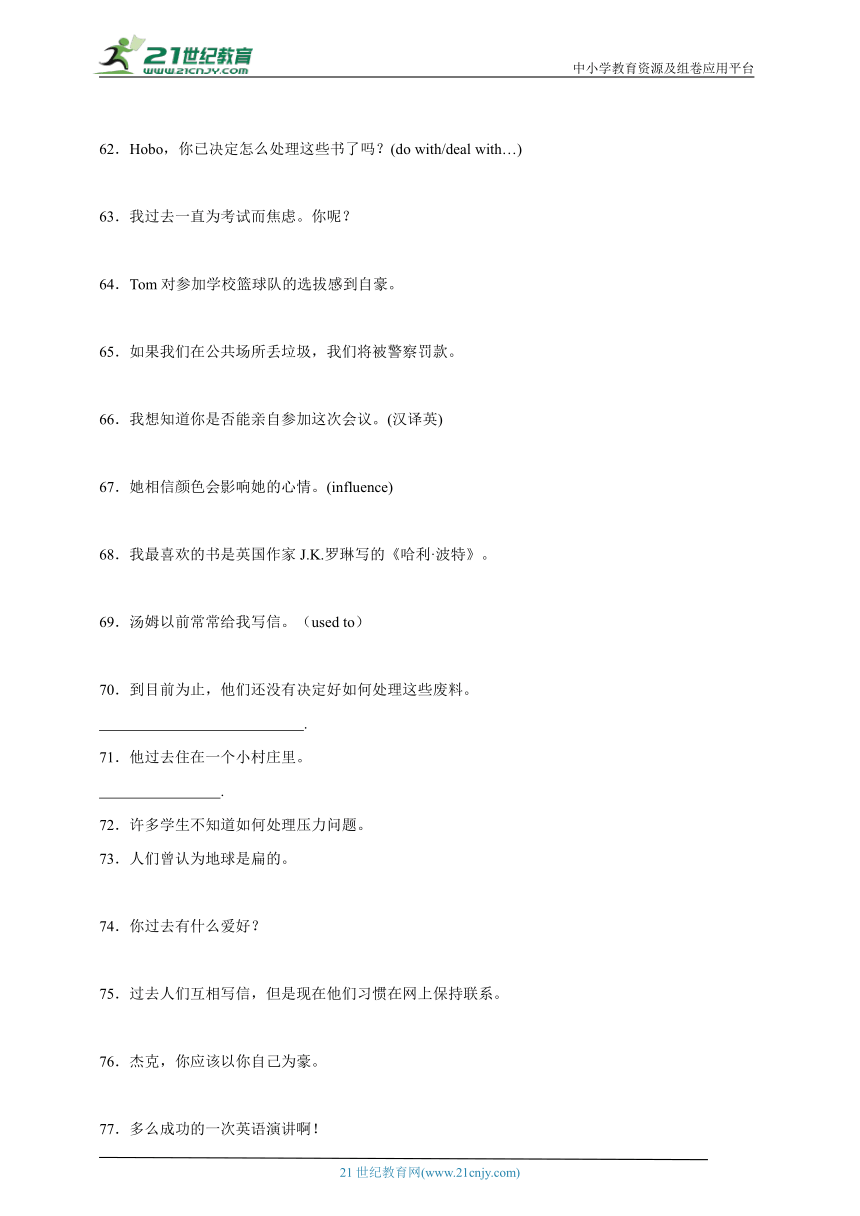
文档简介
中小学教育资源及组卷应用平台
Unit 4 I used to be afraid of the dark. 汉译英 专练(含解析)人教新目标(Go for it)版 英语九年级上册
1.人们应该更多地乘坐公共交通工具。
2.因为很差的发音,我过去很害怕在公共场合演讲。
3.防范学生周边任何可能的危险是有必要的。
4.现在我不时地感到有一点孤单。
5.如何处理这台损坏的机器,你能给我些建议吗
6.我父母亲以我为荣。(parent)
7.我不知道我该如何处理它。
8.你能告诉我该如何处理这些旧书吗?(汉译英)
9.我过去不常常收集棒球卡片。
10.政府已经决定如何处理这些污染物了吗?
11.你能告诉我怎样处理交通事故吗?
12.假如你需要力量,红色有可能对你有些帮助。
13.人们过去常常把废弃物投放进河里。
14.似乎他们不是对广大听众说话而是亲自对我说话。
15.我们城市以王尽美为骄傲。
16.在大会上我们校长将亲自为你颁奖。(in person) (汉译英)
17.它在把我们引向那座由面包、蛋糕和糖果做成的美妙房屋。
18.她的丈夫过去很健康,现在偶尔看上去不健康。
19.我们应该避免在背景中制造任何噪音。(avoid doing sth.)
.
20.我父亲过去常常在我睡觉前给我讲故事。(used to)
21.学生们做了简短的致辞,并感谢了他们的老师。(give thanks)
22.美国学生放暑假的周数比英国学生要多得多。
23.我过去常熬夜,但我现在睡觉很早。
24.很多学生不知道如何应对学习压力。( deal with )
25.在欧洲国家,人们依靠丰富的资源来生活。
26.他时不时感到有点孤独。
27.对你来说,要求每件事情都按你的方式进行是没有好处的。
28.你知道怎么处理这个问题吗?
29.他过去常常不吃早饭乘公交上班。
30.他不得不亲自做这件事。(汉译英)
31.我过去怕黑。
32.他们经常用糖果招待我们。
33.我为我们伟大的祖国而感到骄傲。
.
34.我不确定如何处理这个问题。
35.我以中国为荣。( be proud of )
.
36.许多和你同龄的青少年也时常感到孤独。
37.几乎每集动画片都以Tom陷入困境而Jerry嘲笑它告终。(U4)
38.我哥哥乐于助人,我父母以他为荣。(be proud of)
39.他从不害怕当众演讲。
40.她以前很害羞,不敢在公开场合唱歌。(汉译英)
41.你怎样看待自己的性格变化
42.我过去一直住在伦敦。
43.这些女士多么幽默啊!
44.我过去是足球队的队员。
45.如果你亲自来滨州,你就会爱上这个城市。(fall in love)
46.我们为中国感到自豪。(proud)
47.我们需要提防我们周围任何可能的危险。(guard against)
48.他爷爷过去常常给我们讲有趣的故事以逗得我们哈哈大笑。
49.帮助他们重见光明,提高生活水平,我感到很自豪。
50.我为我弟弟感到骄傲,因为他非常擅长数学。
51.我的父母太忙了,很少有时间照顾我。(so…that…)
.
52.他可以帮我们处理很多的困难。
53.我不知道如何应对这种情况。( deal with)
54.他不知道如何处理这个问题。 (deal with)
55.我们每天应该至少睡8个小时。 (at least)
56.他们已经学起打高尔夫球了。 (take up)
57.你一直在这个城市工作吗? (all the time)
58.今天我有大量的事情要做。 (tons of)
59.他喜欢在空闲时间闲逛。 (hang out)
60.许多人正在沙滩上享受阳光。 (a number of)
61.这个女孩害怕狗。 (be afraid of)
62.Hobo,你已决定怎么处理这些书了吗?(do with/deal with…)
63.我过去一直为考试而焦虑。你呢?
64.Tom对参加学校篮球队的选拔感到自豪。
65.如果我们在公共场所丢垃圾,我们将被警察罚款。
66.我想知道你是否能亲自参加这次会议。(汉译英)
67.她相信颜色会影响她的心情。(influence)
68.我最喜欢的书是英国作家J.K.罗琳写的《哈利·波特》。
69.汤姆以前常常给我写信。(used to)
70.到目前为止,他们还没有决定好如何处理这些废料。
.
71.他过去住在一个小村庄里。
.
72.许多学生不知道如何处理压力问题。
73.人们曾认为地球是扁的。
74.你过去有什么爱好?
75.过去人们互相写信,但是现在他们习惯在网上保持联系。
76.杰克,你应该以你自己为豪。
77.多么成功的一次英语演讲啊!
!
参考答案:
1.People should take public transportation more.
【详解】人们people;应该should;乘坐公共交通工具take public transportation,should后用动词原形,更多地more,修饰动词短语。故填People should take public transportation more.
2.I used to be afraid of speaking/to speak in public because of my poor pronunciation.
【详解】“我”I;“过去”used to+动词原形;“害怕做某事”be afraid of+doing/be afraid+to do sth;“演讲”speak;“在公共场合”in public;“因为”because of;“很差的发音”poor pronunciation。故填I used to be afraid of speaking/to speak in public because of my poor pronunciation.
3.It is necessary to guard against any possible danger around students.
【详解】It is+形容词+to do sth做某事是……;necessary必要的,是形容词;guard against防范;possible可能的;danger危险;around周围的;students学生。故填It is necessary to guard against any possible danger around students.
4.I feel a little lonely from time to time.
【详解】句子用一般现在时,主语是I,谓语动词用原形feel;系动词后作表语用形容词a little lonely“有一点孤单”;不时地:from time to time。故填I feel a little lonely from time to time.
5.Can you give me some advice on how to deal with the broken machine
【详解】分析汉语意思可知,该句可以用句型:Can you do sth.,give sb. some advice on sth.“针对某事,给某人些建议”,该句中是给“我”建议,作宾语,用“me”,该句为简单句,故“如何处理这台损坏的机器”可用疑问词+动词不定式结构,“如何”用“how to”,deal with“处理”,broken machine“损坏的机器”,此处表特指,前用“the”。故填Can you give me some advice on how to deal with the broken machine
6.My parents are proud of me.
【详解】“我父母”my parents;“以……为荣”be proud of,主语是复数,be动词用are;“我”用于介词of之后,用宾格me。句子开头首字母大写。故填My parents are proud of me.
7.I do not know how I should deal with it.
【详解】“知道”know;“应该”should,情态动词后接原形动词;“如何”how,问方式;“处理”deal with。根据句意结构,本句是how引导的宾语从句,否定意义,需要否定前移,用陈述句语序;“我”I是主语,助动词需用do; “它”it作deal with的宾语;故填I do not know how I should deal with it.
8.Can you tell me how to deal with these old books /Can you tell me what to do with these old books /Can you tell me how I should deal with these old books /Can you tell me what I should do with these old books
【详解】“能”can,情态动词;“告诉某人某事”tell sb sth;“处理某物”deal with(常与连接副词how连用)或do with(常与连接代词what连用);“这些旧书”these old books。根据题干可知,句子为情态动词can引导的一般疑问句,位于句首,首字母需大写,用“Can+主语+动词原形+其他 ”的结构,主语为you,动词tell“告诉”后接人称代词宾格,me“我”,宾格,作间接宾语,其后接宾语从句,作直接宾语,用连接代词what或连接副词how引导,从句主语为I,情态动词should“应该”,表征求意见,后接动词原形,do“做”,动词,deal“处理”,动词,或接“疑问词+动词不定式”的结构,作直接宾语,how to deal with sth=what to do with sth。故填Can you tell me how to deal with these old books /Can you tell me what to do with these old books /Can you tell me how I should deal with these old books /Can you tell me what I should do with these old books
9.I didn’t use to collect baseball cards.
【详解】我:I;过去常常做某事:used to do;收集:collect;棒球卡片:baseball cards。结合语境可知,此题为一般过去时,实义动词过去时的否定句应该用didn’t+动词原形。故填I didn’t use to collect baseball cards.
10.Has the government decided how to deal with the pollution yet
【详解】根据句末问号可知,本句是疑问句,结合“已经”可知,本句应用现在完成时,主语“the government”是单数,此处应把助动词has提到句首。政府:the government;决定:decided,此处用过去分词形式;如何做:how to do;处理:deal with;这些污染物:the pollution,此处是特指,应用定冠词the。已经:yet,本句是问句,yet用于疑问句末尾。故填Has the government decided how to deal with the pollution yet
11.Could you tell me how to deal with the traffic accidents
【详解】根据问号和句意可知,此句为一般疑问句;你能告诉我:Could you tell me...;交通事故:the traffic accidents;如何处理:how to deal with。故填Could you tell me how to deal with the traffic accidents
12.If you require strength, red may be of some help to you.
【详解】require“需要”;strength“力量”;red“红色”;may“可能”,后接动词原形;be of some help to you“对你有些帮助”;if表示“假如,如果”,引导条件状语从句,主句含有情态动词,从句用一般现在时,从句的主语you是第二人称,动词用原形,故填If you require strength, red may be of some help to you.
13.People used to throw the waste into the river.
【详解】人们:people;过去常常做某事:used to do sth.;把……扔进:throw...into;废弃物:the waste;河:the river。故填People used to throw the waste into the river.
14.It seemed that they were speaking not to lots of listeners but to me in person.
【详解】“似乎……”为It seems that+从句;“他们”为they,主格代词;“跟某人讲话”为speak to sb.;“许多听众”为lots of listeners;“不是”为not;“而是”为but;“亲自”为in person。结合语境可知,此题主句应用一般过去时,动词应用过去式seemed;从句应用过去进行时,构成形式为:was/were doing。故填It seemed that they were speaking not to lots of listeners but to me in person.
15.Our city is proud of Wang Jinmei.
【详解】我们城市:our city;以......为骄傲:be proud of;主语是单数第三人称形式,所以be动词用is;故填Our city is proud of Wang Jinmei.
16.Our headmaster will present the prize to you in person at the meeting.
【详解】根据中文提示可知句子是一般将来时,谓语动词用will do结构。“我们校长”our headmaster;“给某人颁奖”present the prize to sb,谓语动词present用一般将来时will present;“亲自”in person;“在大会上”at the meeting。故填Our headmaster will present the prize to you in person at the meeting.
17.It’s leading us to that wonderful house made of bread, cake and candy.
【详解】本句时态用现在进行时;“把某人引到某地”lead sb to sp;“那座美妙房子”that wonderful house;“由……做成的”make of,此处用过去分词作后置定语修饰名词;“面包、蛋糕和糖果”bread, cake and candy。故填It’s leading us to that wonderful house made of bread, cake and candy.
18.Her husband used to be a very healthy man, but now he looks unhealthy from time to time.
【详解】her husband她的丈夫,主语;used to过去常常;a very healthy man很健康;he looks unhealthy他看上去不健康;from time to time偶尔。第二句的时间状语是now,所以用一般现在时。句子的主语是he,所以谓语动词用第三人称单数形式。故填Her husband used to be a very healthy man, but now he looks unhealthy from time to time.
19.We should avoid making any noise in the background
【详解】我们:we;应该:should;避免制造任何噪音:avoid making any noise;在背景中:in the background。此句是建议性句型,应用一般现在时。故填We should avoid making any noise in the background。
20.My father used to tell me stories before I went to sleep.
【详解】我父亲:my father;used to do sth:过去常常做某事;给我讲故事:tell me stories;在我睡觉前:before I go to sleep;表示过去时态用一般过去时。go的过去式是went。故填My father used to tell me stories before I went to sleep.
21.The students made short speeches and gave thanks to their teachers.
【详解】根据句意可知,时态是一般过去时;学生们the students,做了简短的致辞made short speeches,并and,感谢了他们的老师gave thanks to their teachers。故填The students made short speeches and gave thanks to their teachers.
22.American students have many more weeks off for the summer holiday than British students.
【详解】句意:美国学生放暑假的周数比英国学生要多得多。本句表达的是现在情况,可知此句时态使用一般现在时,句型是比较级句型。“have+一段时间+off”表示“休多长时间的假”;many more +可数名词复数:…多得多;结合句意可知答案是American students have many more weeks off for the summer holiday than British students.
23.I used to stay up late, but now I go to bed early.
【详解】过去常常做某事:used to do sth;熬夜:stay up late;但是:but;现在:now;睡觉早:go to bed early。故填I used to stay up late, but now I go to bed early.
24.Many students don't know how to deal with stress.
【详解】how to deal with如何处理,故此处为Many students don't know how to deal with stress.
25.In European countries, people depend on the rich resources to live.
【详解】在欧洲国家:in European countries;人们:people;依靠:depend on;丰富的资源:the rich resources;生活:live;depend on the rich resources to live依靠丰富的资源来生活;根据语境可知,句子陈述客观事实,时态为一般现在时,主语是people,集合名词,谓语动词用原形;句首首字母大写。故填In European countries, people depend on the rich resources to live.
26.He feels a little lonely from time to time.
【详解】句子用一般现在时,感到:feel,主语是he,谓语动词用单三feels;有点孤独:a little lonely;时不时:from time to time,状语,放句尾。故填He feels a little lonely from time to time.
27.It’s no good for you to require everything to go your way.
【详解】根据汉语意思可知,此句it作形式主语,动词不定式作真正主语。It’s+形容词+for sb to do sth表示“做某事对某人来说是……的” ;no good表示“没有好处的”;require everything to go表示“要求每件事情都按……进行 ”; your way表示“你的方式”,主语为you。故填It’s no good for you to require everything to go your way.
28.Do you know how to deal with this problem
【详解】由句意和语境可知本句翻译成一般疑问句,用一般现在时。你知道:do you know,句首首字母大写;“怎么处理”用“疑问词+to do”的结构,翻译成how to deal with;这个问题:this problem。故填Do you know how to deal with this problem
29.He used to take a bus to work without having breakfast.
【详解】“他”he;“乘公交上班”take a bus to work;“吃早饭”:have breakfast;“不(做某事)”without;without是介词,所以have要用动名词形式。根据汉语提示可知,时态为一般过去式,used to do sth.意为“过去常常做某事”。故填He used to take a bus to work without having breakfast.
30.He has to do it in person/personally/by himself.
【详解】he“他”;have to do“不得不做”,主语是第三人称单数,动词用三单形式;it代指“这件事”; in person/personally/by himself“亲自”。故填He has to do it in person/personally/by himself.
31.I used to be afraid of the dark.
【详解】句子主语是I“我”;过去常常做某事:used to do sth;害怕:be afraid of;黑:the dark。故填I used to be afraid of the dark.
32.They often give us candy as a treat.
【详解】根据句意可知,本句为一般现在时态的陈述句。they代词,他们,复数含义,谓语动词使用原形;often副词,经常; give动词,给,give sb. sth.给某人某物;us宾格,我们;give us candy给我们一些糖;as a treat.当作招待。 所以答案为:They often give us candy as a treat。
33.I am proud of our great country/I take pride in our great country
【详解】be proud of和take pride in都表示“以……为傲”;our great country“我们伟大的祖国”;句子是一般现在时,主语I是第一人称,be动词用am,实义动词用原形,故填I am proud of our great country/I take pride in our great country。
34.I’m not sure how to deal with the problem.
【详解】根据题干可知,时态为一般现在时。我不确定:I’m not sure;如何:how;处理:deal with,此处用“how+动词不定式”作宾语;这个问题:the problem。故填I’m not sure how to deal with the problem.
35.I’m proud of China
【详解】以……为荣:be proud of。主语是第一人称I,所以be用am。故填I’m proud of China。
36.Many teenagers of your age also feel lonely from time to time.
【详解】许多和你同龄的青少年many teenagers of your age;也also,用在句中;时常from time to time;感到孤独feel lonely。本句时态是一般现在时,故填Many teenagers of your age also feel lonely from time to time.
37.Almost every cartoon ends with Tom in trouble and Jerry laughing at him.
【详解】“几乎”almost;“每集动画片”every cartoon;“以……告终”end with;“陷入困境”in trouble;“嘲笑它”laugh at him。根据语境可知,句子为一般现在时,由于主语every cartoon为第三人称单数,故谓语动词应用三单形式,即ends with,此处“Tom陷入困境”和“Jerry嘲笑它”为并列结构,故应用and连接,且“嘲笑它”应用laughing at him。故填Almost every cartoon ends with Tom in trouble and Jerry laughing at him.
38.My brother is helpful and my parents are proud of him.
【详解】我哥哥:my brother;乐于助人的:helpful;和:and,是连词;我父母:my parents;以他为荣:be proud of him;主语是my brother,一般现在时态,be动词用is,主语是my parents,be动词用are,故填My brother is helpful and my parents are proud of him.
39.He is never afraid of making a speech in public.
【详解】他:he;从不:never;害怕:be afraid of doing sth.;当众:in public;演讲:make a speech。结合语境可知,此题为一般现在时。主语he是单数,因此be用is。故填He is never afraid of making a speech in public.
40.She used to be shy and (was) afraid of singing/to sing in public.
【详解】She“她”,作主语;used to do“过去,以前”;shy“害羞的”,形容词作表语;be afraid of doing/to do sth“害怕做某事”;sing“唱歌”;in public“在公开场合”。句子时态为一般过去时。故填She used to be shy and (was) afraid of singing/to sing in public.
41.What do you think of your personality change
【详解】根据中文句意可知,本句为特殊疑问句。你怎样看待:What do you think of,固定用法;性格变化:personality change。故填What do you think of your personality change
42.I used to live in London.
【详解】我过去一直住在伦敦。根据used to do过去常常做某事;故答案是I used to live in London.
43.How humorous the ladies are!
【详解】根据中文提示可知,该句是感叹句,可以使用句子结构:how+形容词+主语+谓语!“幽默的”humorous;“这些女士”the ladies;系动词使用are,句首单词首字母大写,故填How humorous the ladies are!
44.I used to be on the soccer team.
【详解】主语:I;过去是:used to be,作谓语;足球队的队员:on the soccer team。根据句意可知,此句是一般过去时。故填I used to be on the soccer team.
45.If you come to Binzhou in person, you will fall in love with this city.
【详解】“如果”if;“你”you;“来滨州”come to Binzhou;“亲自”in person;“爱上这个城市”fall in love with this city。if引导的条件状语从句遵循“主将从现”原则。故填If you come to Binzhou in person, you will fall in love with this city.
46.We are proud of China.
【详解】“我们”we,作主语;“为……感到自豪”be proud of;“中国”China。此处陈述一般事实,用一般现在时,主语“we”后用be动词are。故填We are proud of China.
47.We need to guard against any possible danger around us.
【详解】根据句意“我们需要提防我们周围任何可能的危险。”可知时态用一般现在时。主语是“我们”we;“需要去做某事”need to do sth.这里need是实义动词,后接动词不定式;“提防”guard against;“任何可能的危险” any possible danger;“我们周围”around us;故答案为We need to guard against any possible danger around us.
48.His grandfather/grandpa used to tell us fun/funny stories to/in order to/so as to make us laugh.
【详解】“他爷爷”为His grandfather/grandpa;“过去常常做某事”为used to do sth.;“给我们讲有趣的故事”为tell us fun/funny stories;“为了”为to/in order to/so as to do sth.;“逗得我们哈哈大笑”为make us laugh,故填His grandfather/grandpa used to tell us fun/funny stories to/in order to/so as to make us laugh.
49.I’m proud to help them see again and improve their lives.
【详解】根据中文句意可知,I’m proud to do sth“我感到很自豪做某事”;help them“帮助他们”;see again“重见光明”;improve their lives“提高生活水平”。and连接两个并列动词短语,help sb do sth“帮助某人做某事”。故填I’m proud to help them see again and improve their lives.
50.I am proud of my brother because he is very good at maths.
【详解】根据句意可知用一般现在时。“我”I,作主语;“为……感到骄傲”be proud of,I后用be动词am;“我弟弟”my brother;“因为”because,引导原因状语从句;“他”he,作从句主语;“擅长”be good at,he后用be动词is;“非常”very,修饰good;“数学”maths。故填I am proud of my brother because he is very good at maths.
51.My parents are so busy that they seldom have time to look after me.
【详解】由汉语可知,时态用一般现在时;太……而不能……:so ... that,引导结果状语从句;我的父母:my parents,作主句主语,be动词用are;忙碌的:busy,形容词作表语;他们:they,作从句主语;很少:seldom;有时间做某事:have time to do sth.;照顾:look after;我:me,用于介词后。故填My parents are so busy that they seldom have time to look after me.
52.He can help us deal with many difficulties.
【详解】he“他”;can“可以”,情态动词后跟动词原形;help sb. do sth.“帮助某人做某事”,动词用省略to的不定式形式;deal with“处理”; many“许多”;difficulty“困难”,可数名词,“许多的困难”要用复数形式difficulties。故填He can help us deal with many difficulties.
53.I don’t know how to deal with this situation.
【详解】主句是I don’t know,其后是宾语从句部分,连接词是how表示“如何”,短语“应对这种情况”是deal with this situation,故翻译为:I don't know how to deal with this situation.
54.He doesn’t know how to deal with this problem. 55.We should sleep at least eight hours every day. 56.They have taken up golf. 57.Do you work in this city all the time 58.I have tons of things to do today. 59.He likes hanging out in his free time. 60.A number of people are enjoying the sunshine on the beach. 61.This girl is afraid of dogs.
【解析】54.how to deal with如何处理,故此处为He doesn’t know how to deal with this problem.
55.at least 至少,eight hours八小时,every day每天,故此处为We should sleep at least eight hours every day.
56.take up开始学习,根据已经学起了,故用现在完成时,故为They have taken up golf.
57.in this city在这座城市,all the time一直,此处是一般疑问句,修饰主语you,谓语work“工作”,用助动词do位于句首,后面谓语用动词原形work。故此处为Do you work in this city all the time
58.tons of“大量的”,have sth to do 有事要做,故此处为I have tons of things to do today.
59.hang out闲逛,in one’s free time“在某人空闲的时候”,like doing sth喜欢做某事。主语he“他”是第三人称单数,故谓语用第三人称单数,故为He likes hanging out in his free time.
60.a number of“许多”,修饰名词,作主语时,谓语用复数形式。enjoy the sunshine享受阳光,on the beach在沙滩上,故此处为A number of people are enjoying the sunshine on the beach.
61.be afraid of害怕,主语this girl“这个女孩”是第三人称单数,故谓语用第三人称单数,故为This girl is afraid of dogs.
62.Hobo, have you decided what to do with the books/how to deal with the books
【详解】根据汉语提示,是现在完成时的一般疑问句,其结构是“have/has+主语+动词过去分词”;主语是you,直接把助动词have提前;决定:decide,此处用过去分词decided;怎么处理what to do with/how to deal with(do with侧重对象,常与连接代词 what 连用,而deal with侧重方式,常与连接副词how连用)。此处是疑问词+to do的形式,作decide的宾语,这些书:the books;根据中英文提示,故填Hobo, have you decided what to do with the books/how to deal with the books
63.I used to be nervous about tests all the time. What about you
【详解】过去常常做某事:used to do sth.;一直:all the time;为考试而焦虑: be nervous about tests ;你呢:what about you。故填I used to be nervous about tests all the time. What about you
64.Tom is proud of trying out for the school basketball team.
【详解】“对做某事感到自豪”为be proud of doing sth.;“参加……的选拔”为try out for sth.;“学校篮球队”为the school basketball team;结合句意,该句为一般现在时,主语为Tom,be动词用is,try动名词为trying,故答案为Tom is proud of trying out for the school basketball team.
65.If we drop litter in public/in a public place/in public places, we will be fined by the police.
【详解】分析句子可知,句子是If引导的条件状语从句,主句用一般将来时,从句用一般现在时;我们:we,作主语;丢垃圾:drop litter;在公共场合:in public/in a public place/in public places;被罚款:be fined by;警察:police。故填If we drop litter in public/in a public place/in public places, we will be fined by the police.
66.I wonder if/whether you can attend the meeting in person.
【详解】我:I;想知道:wonder,作谓语;是否if/whether;你能亲自参加这次会议:you can attend the meeting in person,宾语从句,语序为陈述句语序,can为情态动词后接动词原形,in person“亲自”,作宾语从句的状语,根据情境句子时态为一般现在时,故填I wonder if/whether you can attend the meeting in person.
67.She believes (that) colors/colours can influence her moods.
【详解】相信:believe,主语she是第三人称单数,谓语动词用三单形式,它后面跟一个that引导的宾语从句,that可以省略;颜色:colour/color;影响:influence;她的心情:her moods。故答案为She believes (that) colours can influence her moods.
68.My favorite/favourite book is Harry Potter written by British writer, J. K. Rowling.
【详解】“我最喜欢的书”my favorite/favourite book,主语是单数其后用be动词is表示“是”;“《哈利·波特》”Harry Potter,其后接过去分词短语“written by British writer, J. K. Rowling”表示“英国作家J.K.罗琳写的”,作后置定语。故填My favorite/favourite book is Harry Potter written by British writer, J. K. Rowling.
69.Tom used to write to me.
【详解】Tom“汤姆”;used to do sth“过去常常做某事”,为固定短语;write to sb“写信给某人”,也是固定短语;me“我”,代词宾格。故填Tom used to write to me.
70.So far, they haven’t decided how to deal with the waste/So far, they haven’t decided what to do with the waste
【详解】根据题干,句子应用现在完成时,结构为have/has+过去分词;到目前为止:so far;他们:they,作主语,是复数;还没决定好:haven’t decided;如何处理这些废料:how to deal with the waste/what to do with the waste。故填So far, they haven’t decided how to deal with the waste/So far, they haven’t decided what to do with the waste。
71.He used to live in a small village.
【详解】他:he;过去做某事:used to do sth.;住在:live in;一个小村庄里:a small village。故填He used to live in a small village.
72.Many students don’t know how to deal with the problem of stress.
【详解】很多学生不知道….后面是做“知道”的宾语,所以这里用宾语从句,在宾语从句中,怎么做某事,可以用特殊疑问词加to do不定式的形式, “处理”deal with, 压力问题problem of stress, 故填Many students don’t know how to deal with the problem of stress.
73.People used to think that the earth was flat.
【详解】人们曾认为地球是扁的。根据used to do过去常常做某事;故答案是People used to think that the earth was flat.
74.What hobbies did you use to have
【详解】根据汉语意思可知,本句是what引导的特殊疑问句,时态是一般过去时。hobby“爱好”,名词,用于复数形式,位于疑问词what后。used to do sth.“过去常做某事”,在疑问句中,将助动词did提到主语前,used变为use;have“有”,动词,用其原形。故填What hobbies did you use to have
75.People used to write letters to each other, but now they are used to keeping in touch on the Internet.
【详解】过去做某事:used to do sth;互相写信:write letters to each other;但是:but;习惯于:be used to doing sth;在网上:on the Internet;保持联系:keep in touch。前半句是一般过去时,后半句是一般现在时,故填People used to write letters to each other, but now they are used to keeping in touch on the Internet.
76.Jack, you should be proud of yourself.
【详解】“杰克”Jack;“你”you;“应该”should,情态动词后跟动词原形;“以……为傲”be proud of...;“你自己”yourself。故填Jack, you should be proud of yourself.
77.What a successful English speech (it is)/ How successful the English speech is
【详解】分析句子可知是感叹句。且演讲是可数名词,可以用结构:What+a/an (a)+形容词(successful)+可数名词(English speech)+(主谓“it is”)/How+形容词(successful)+主语(the English speech)+谓语(is)。故填What a successful English speech (it is)/ How successful the English speech is。
21世纪教育网 www.21cnjy.com 精品试卷·第 2 页 (共 2 页)
21世纪教育网(www.21cnjy.com)
Unit 4 I used to be afraid of the dark. 汉译英 专练(含解析)人教新目标(Go for it)版 英语九年级上册
1.人们应该更多地乘坐公共交通工具。
2.因为很差的发音,我过去很害怕在公共场合演讲。
3.防范学生周边任何可能的危险是有必要的。
4.现在我不时地感到有一点孤单。
5.如何处理这台损坏的机器,你能给我些建议吗
6.我父母亲以我为荣。(parent)
7.我不知道我该如何处理它。
8.你能告诉我该如何处理这些旧书吗?(汉译英)
9.我过去不常常收集棒球卡片。
10.政府已经决定如何处理这些污染物了吗?
11.你能告诉我怎样处理交通事故吗?
12.假如你需要力量,红色有可能对你有些帮助。
13.人们过去常常把废弃物投放进河里。
14.似乎他们不是对广大听众说话而是亲自对我说话。
15.我们城市以王尽美为骄傲。
16.在大会上我们校长将亲自为你颁奖。(in person) (汉译英)
17.它在把我们引向那座由面包、蛋糕和糖果做成的美妙房屋。
18.她的丈夫过去很健康,现在偶尔看上去不健康。
19.我们应该避免在背景中制造任何噪音。(avoid doing sth.)
.
20.我父亲过去常常在我睡觉前给我讲故事。(used to)
21.学生们做了简短的致辞,并感谢了他们的老师。(give thanks)
22.美国学生放暑假的周数比英国学生要多得多。
23.我过去常熬夜,但我现在睡觉很早。
24.很多学生不知道如何应对学习压力。( deal with )
25.在欧洲国家,人们依靠丰富的资源来生活。
26.他时不时感到有点孤独。
27.对你来说,要求每件事情都按你的方式进行是没有好处的。
28.你知道怎么处理这个问题吗?
29.他过去常常不吃早饭乘公交上班。
30.他不得不亲自做这件事。(汉译英)
31.我过去怕黑。
32.他们经常用糖果招待我们。
33.我为我们伟大的祖国而感到骄傲。
.
34.我不确定如何处理这个问题。
35.我以中国为荣。( be proud of )
.
36.许多和你同龄的青少年也时常感到孤独。
37.几乎每集动画片都以Tom陷入困境而Jerry嘲笑它告终。(U4)
38.我哥哥乐于助人,我父母以他为荣。(be proud of)
39.他从不害怕当众演讲。
40.她以前很害羞,不敢在公开场合唱歌。(汉译英)
41.你怎样看待自己的性格变化
42.我过去一直住在伦敦。
43.这些女士多么幽默啊!
44.我过去是足球队的队员。
45.如果你亲自来滨州,你就会爱上这个城市。(fall in love)
46.我们为中国感到自豪。(proud)
47.我们需要提防我们周围任何可能的危险。(guard against)
48.他爷爷过去常常给我们讲有趣的故事以逗得我们哈哈大笑。
49.帮助他们重见光明,提高生活水平,我感到很自豪。
50.我为我弟弟感到骄傲,因为他非常擅长数学。
51.我的父母太忙了,很少有时间照顾我。(so…that…)
.
52.他可以帮我们处理很多的困难。
53.我不知道如何应对这种情况。( deal with)
54.他不知道如何处理这个问题。 (deal with)
55.我们每天应该至少睡8个小时。 (at least)
56.他们已经学起打高尔夫球了。 (take up)
57.你一直在这个城市工作吗? (all the time)
58.今天我有大量的事情要做。 (tons of)
59.他喜欢在空闲时间闲逛。 (hang out)
60.许多人正在沙滩上享受阳光。 (a number of)
61.这个女孩害怕狗。 (be afraid of)
62.Hobo,你已决定怎么处理这些书了吗?(do with/deal with…)
63.我过去一直为考试而焦虑。你呢?
64.Tom对参加学校篮球队的选拔感到自豪。
65.如果我们在公共场所丢垃圾,我们将被警察罚款。
66.我想知道你是否能亲自参加这次会议。(汉译英)
67.她相信颜色会影响她的心情。(influence)
68.我最喜欢的书是英国作家J.K.罗琳写的《哈利·波特》。
69.汤姆以前常常给我写信。(used to)
70.到目前为止,他们还没有决定好如何处理这些废料。
.
71.他过去住在一个小村庄里。
.
72.许多学生不知道如何处理压力问题。
73.人们曾认为地球是扁的。
74.你过去有什么爱好?
75.过去人们互相写信,但是现在他们习惯在网上保持联系。
76.杰克,你应该以你自己为豪。
77.多么成功的一次英语演讲啊!
!
参考答案:
1.People should take public transportation more.
【详解】人们people;应该should;乘坐公共交通工具take public transportation,should后用动词原形,更多地more,修饰动词短语。故填People should take public transportation more.
2.I used to be afraid of speaking/to speak in public because of my poor pronunciation.
【详解】“我”I;“过去”used to+动词原形;“害怕做某事”be afraid of+doing/be afraid+to do sth;“演讲”speak;“在公共场合”in public;“因为”because of;“很差的发音”poor pronunciation。故填I used to be afraid of speaking/to speak in public because of my poor pronunciation.
3.It is necessary to guard against any possible danger around students.
【详解】It is+形容词+to do sth做某事是……;necessary必要的,是形容词;guard against防范;possible可能的;danger危险;around周围的;students学生。故填It is necessary to guard against any possible danger around students.
4.I feel a little lonely from time to time.
【详解】句子用一般现在时,主语是I,谓语动词用原形feel;系动词后作表语用形容词a little lonely“有一点孤单”;不时地:from time to time。故填I feel a little lonely from time to time.
5.Can you give me some advice on how to deal with the broken machine
【详解】分析汉语意思可知,该句可以用句型:Can you do sth.,give sb. some advice on sth.“针对某事,给某人些建议”,该句中是给“我”建议,作宾语,用“me”,该句为简单句,故“如何处理这台损坏的机器”可用疑问词+动词不定式结构,“如何”用“how to”,deal with“处理”,broken machine“损坏的机器”,此处表特指,前用“the”。故填Can you give me some advice on how to deal with the broken machine
6.My parents are proud of me.
【详解】“我父母”my parents;“以……为荣”be proud of,主语是复数,be动词用are;“我”用于介词of之后,用宾格me。句子开头首字母大写。故填My parents are proud of me.
7.I do not know how I should deal with it.
【详解】“知道”know;“应该”should,情态动词后接原形动词;“如何”how,问方式;“处理”deal with。根据句意结构,本句是how引导的宾语从句,否定意义,需要否定前移,用陈述句语序;“我”I是主语,助动词需用do; “它”it作deal with的宾语;故填I do not know how I should deal with it.
8.Can you tell me how to deal with these old books /Can you tell me what to do with these old books /Can you tell me how I should deal with these old books /Can you tell me what I should do with these old books
【详解】“能”can,情态动词;“告诉某人某事”tell sb sth;“处理某物”deal with(常与连接副词how连用)或do with(常与连接代词what连用);“这些旧书”these old books。根据题干可知,句子为情态动词can引导的一般疑问句,位于句首,首字母需大写,用“Can+主语+动词原形+其他 ”的结构,主语为you,动词tell“告诉”后接人称代词宾格,me“我”,宾格,作间接宾语,其后接宾语从句,作直接宾语,用连接代词what或连接副词how引导,从句主语为I,情态动词should“应该”,表征求意见,后接动词原形,do“做”,动词,deal“处理”,动词,或接“疑问词+动词不定式”的结构,作直接宾语,how to deal with sth=what to do with sth。故填Can you tell me how to deal with these old books /Can you tell me what to do with these old books /Can you tell me how I should deal with these old books /Can you tell me what I should do with these old books
9.I didn’t use to collect baseball cards.
【详解】我:I;过去常常做某事:used to do;收集:collect;棒球卡片:baseball cards。结合语境可知,此题为一般过去时,实义动词过去时的否定句应该用didn’t+动词原形。故填I didn’t use to collect baseball cards.
10.Has the government decided how to deal with the pollution yet
【详解】根据句末问号可知,本句是疑问句,结合“已经”可知,本句应用现在完成时,主语“the government”是单数,此处应把助动词has提到句首。政府:the government;决定:decided,此处用过去分词形式;如何做:how to do;处理:deal with;这些污染物:the pollution,此处是特指,应用定冠词the。已经:yet,本句是问句,yet用于疑问句末尾。故填Has the government decided how to deal with the pollution yet
11.Could you tell me how to deal with the traffic accidents
【详解】根据问号和句意可知,此句为一般疑问句;你能告诉我:Could you tell me...;交通事故:the traffic accidents;如何处理:how to deal with。故填Could you tell me how to deal with the traffic accidents
12.If you require strength, red may be of some help to you.
【详解】require“需要”;strength“力量”;red“红色”;may“可能”,后接动词原形;be of some help to you“对你有些帮助”;if表示“假如,如果”,引导条件状语从句,主句含有情态动词,从句用一般现在时,从句的主语you是第二人称,动词用原形,故填If you require strength, red may be of some help to you.
13.People used to throw the waste into the river.
【详解】人们:people;过去常常做某事:used to do sth.;把……扔进:throw...into;废弃物:the waste;河:the river。故填People used to throw the waste into the river.
14.It seemed that they were speaking not to lots of listeners but to me in person.
【详解】“似乎……”为It seems that+从句;“他们”为they,主格代词;“跟某人讲话”为speak to sb.;“许多听众”为lots of listeners;“不是”为not;“而是”为but;“亲自”为in person。结合语境可知,此题主句应用一般过去时,动词应用过去式seemed;从句应用过去进行时,构成形式为:was/were doing。故填It seemed that they were speaking not to lots of listeners but to me in person.
15.Our city is proud of Wang Jinmei.
【详解】我们城市:our city;以......为骄傲:be proud of;主语是单数第三人称形式,所以be动词用is;故填Our city is proud of Wang Jinmei.
16.Our headmaster will present the prize to you in person at the meeting.
【详解】根据中文提示可知句子是一般将来时,谓语动词用will do结构。“我们校长”our headmaster;“给某人颁奖”present the prize to sb,谓语动词present用一般将来时will present;“亲自”in person;“在大会上”at the meeting。故填Our headmaster will present the prize to you in person at the meeting.
17.It’s leading us to that wonderful house made of bread, cake and candy.
【详解】本句时态用现在进行时;“把某人引到某地”lead sb to sp;“那座美妙房子”that wonderful house;“由……做成的”make of,此处用过去分词作后置定语修饰名词;“面包、蛋糕和糖果”bread, cake and candy。故填It’s leading us to that wonderful house made of bread, cake and candy.
18.Her husband used to be a very healthy man, but now he looks unhealthy from time to time.
【详解】her husband她的丈夫,主语;used to过去常常;a very healthy man很健康;he looks unhealthy他看上去不健康;from time to time偶尔。第二句的时间状语是now,所以用一般现在时。句子的主语是he,所以谓语动词用第三人称单数形式。故填Her husband used to be a very healthy man, but now he looks unhealthy from time to time.
19.We should avoid making any noise in the background
【详解】我们:we;应该:should;避免制造任何噪音:avoid making any noise;在背景中:in the background。此句是建议性句型,应用一般现在时。故填We should avoid making any noise in the background。
20.My father used to tell me stories before I went to sleep.
【详解】我父亲:my father;used to do sth:过去常常做某事;给我讲故事:tell me stories;在我睡觉前:before I go to sleep;表示过去时态用一般过去时。go的过去式是went。故填My father used to tell me stories before I went to sleep.
21.The students made short speeches and gave thanks to their teachers.
【详解】根据句意可知,时态是一般过去时;学生们the students,做了简短的致辞made short speeches,并and,感谢了他们的老师gave thanks to their teachers。故填The students made short speeches and gave thanks to their teachers.
22.American students have many more weeks off for the summer holiday than British students.
【详解】句意:美国学生放暑假的周数比英国学生要多得多。本句表达的是现在情况,可知此句时态使用一般现在时,句型是比较级句型。“have+一段时间+off”表示“休多长时间的假”;many more +可数名词复数:…多得多;结合句意可知答案是American students have many more weeks off for the summer holiday than British students.
23.I used to stay up late, but now I go to bed early.
【详解】过去常常做某事:used to do sth;熬夜:stay up late;但是:but;现在:now;睡觉早:go to bed early。故填I used to stay up late, but now I go to bed early.
24.Many students don't know how to deal with stress.
【详解】how to deal with如何处理,故此处为Many students don't know how to deal with stress.
25.In European countries, people depend on the rich resources to live.
【详解】在欧洲国家:in European countries;人们:people;依靠:depend on;丰富的资源:the rich resources;生活:live;depend on the rich resources to live依靠丰富的资源来生活;根据语境可知,句子陈述客观事实,时态为一般现在时,主语是people,集合名词,谓语动词用原形;句首首字母大写。故填In European countries, people depend on the rich resources to live.
26.He feels a little lonely from time to time.
【详解】句子用一般现在时,感到:feel,主语是he,谓语动词用单三feels;有点孤独:a little lonely;时不时:from time to time,状语,放句尾。故填He feels a little lonely from time to time.
27.It’s no good for you to require everything to go your way.
【详解】根据汉语意思可知,此句it作形式主语,动词不定式作真正主语。It’s+形容词+for sb to do sth表示“做某事对某人来说是……的” ;no good表示“没有好处的”;require everything to go表示“要求每件事情都按……进行 ”; your way表示“你的方式”,主语为you。故填It’s no good for you to require everything to go your way.
28.Do you know how to deal with this problem
【详解】由句意和语境可知本句翻译成一般疑问句,用一般现在时。你知道:do you know,句首首字母大写;“怎么处理”用“疑问词+to do”的结构,翻译成how to deal with;这个问题:this problem。故填Do you know how to deal with this problem
29.He used to take a bus to work without having breakfast.
【详解】“他”he;“乘公交上班”take a bus to work;“吃早饭”:have breakfast;“不(做某事)”without;without是介词,所以have要用动名词形式。根据汉语提示可知,时态为一般过去式,used to do sth.意为“过去常常做某事”。故填He used to take a bus to work without having breakfast.
30.He has to do it in person/personally/by himself.
【详解】he“他”;have to do“不得不做”,主语是第三人称单数,动词用三单形式;it代指“这件事”; in person/personally/by himself“亲自”。故填He has to do it in person/personally/by himself.
31.I used to be afraid of the dark.
【详解】句子主语是I“我”;过去常常做某事:used to do sth;害怕:be afraid of;黑:the dark。故填I used to be afraid of the dark.
32.They often give us candy as a treat.
【详解】根据句意可知,本句为一般现在时态的陈述句。they代词,他们,复数含义,谓语动词使用原形;often副词,经常; give动词,给,give sb. sth.给某人某物;us宾格,我们;give us candy给我们一些糖;as a treat.当作招待。 所以答案为:They often give us candy as a treat。
33.I am proud of our great country/I take pride in our great country
【详解】be proud of和take pride in都表示“以……为傲”;our great country“我们伟大的祖国”;句子是一般现在时,主语I是第一人称,be动词用am,实义动词用原形,故填I am proud of our great country/I take pride in our great country。
34.I’m not sure how to deal with the problem.
【详解】根据题干可知,时态为一般现在时。我不确定:I’m not sure;如何:how;处理:deal with,此处用“how+动词不定式”作宾语;这个问题:the problem。故填I’m not sure how to deal with the problem.
35.I’m proud of China
【详解】以……为荣:be proud of。主语是第一人称I,所以be用am。故填I’m proud of China。
36.Many teenagers of your age also feel lonely from time to time.
【详解】许多和你同龄的青少年many teenagers of your age;也also,用在句中;时常from time to time;感到孤独feel lonely。本句时态是一般现在时,故填Many teenagers of your age also feel lonely from time to time.
37.Almost every cartoon ends with Tom in trouble and Jerry laughing at him.
【详解】“几乎”almost;“每集动画片”every cartoon;“以……告终”end with;“陷入困境”in trouble;“嘲笑它”laugh at him。根据语境可知,句子为一般现在时,由于主语every cartoon为第三人称单数,故谓语动词应用三单形式,即ends with,此处“Tom陷入困境”和“Jerry嘲笑它”为并列结构,故应用and连接,且“嘲笑它”应用laughing at him。故填Almost every cartoon ends with Tom in trouble and Jerry laughing at him.
38.My brother is helpful and my parents are proud of him.
【详解】我哥哥:my brother;乐于助人的:helpful;和:and,是连词;我父母:my parents;以他为荣:be proud of him;主语是my brother,一般现在时态,be动词用is,主语是my parents,be动词用are,故填My brother is helpful and my parents are proud of him.
39.He is never afraid of making a speech in public.
【详解】他:he;从不:never;害怕:be afraid of doing sth.;当众:in public;演讲:make a speech。结合语境可知,此题为一般现在时。主语he是单数,因此be用is。故填He is never afraid of making a speech in public.
40.She used to be shy and (was) afraid of singing/to sing in public.
【详解】She“她”,作主语;used to do“过去,以前”;shy“害羞的”,形容词作表语;be afraid of doing/to do sth“害怕做某事”;sing“唱歌”;in public“在公开场合”。句子时态为一般过去时。故填She used to be shy and (was) afraid of singing/to sing in public.
41.What do you think of your personality change
【详解】根据中文句意可知,本句为特殊疑问句。你怎样看待:What do you think of,固定用法;性格变化:personality change。故填What do you think of your personality change
42.I used to live in London.
【详解】我过去一直住在伦敦。根据used to do过去常常做某事;故答案是I used to live in London.
43.How humorous the ladies are!
【详解】根据中文提示可知,该句是感叹句,可以使用句子结构:how+形容词+主语+谓语!“幽默的”humorous;“这些女士”the ladies;系动词使用are,句首单词首字母大写,故填How humorous the ladies are!
44.I used to be on the soccer team.
【详解】主语:I;过去是:used to be,作谓语;足球队的队员:on the soccer team。根据句意可知,此句是一般过去时。故填I used to be on the soccer team.
45.If you come to Binzhou in person, you will fall in love with this city.
【详解】“如果”if;“你”you;“来滨州”come to Binzhou;“亲自”in person;“爱上这个城市”fall in love with this city。if引导的条件状语从句遵循“主将从现”原则。故填If you come to Binzhou in person, you will fall in love with this city.
46.We are proud of China.
【详解】“我们”we,作主语;“为……感到自豪”be proud of;“中国”China。此处陈述一般事实,用一般现在时,主语“we”后用be动词are。故填We are proud of China.
47.We need to guard against any possible danger around us.
【详解】根据句意“我们需要提防我们周围任何可能的危险。”可知时态用一般现在时。主语是“我们”we;“需要去做某事”need to do sth.这里need是实义动词,后接动词不定式;“提防”guard against;“任何可能的危险” any possible danger;“我们周围”around us;故答案为We need to guard against any possible danger around us.
48.His grandfather/grandpa used to tell us fun/funny stories to/in order to/so as to make us laugh.
【详解】“他爷爷”为His grandfather/grandpa;“过去常常做某事”为used to do sth.;“给我们讲有趣的故事”为tell us fun/funny stories;“为了”为to/in order to/so as to do sth.;“逗得我们哈哈大笑”为make us laugh,故填His grandfather/grandpa used to tell us fun/funny stories to/in order to/so as to make us laugh.
49.I’m proud to help them see again and improve their lives.
【详解】根据中文句意可知,I’m proud to do sth“我感到很自豪做某事”;help them“帮助他们”;see again“重见光明”;improve their lives“提高生活水平”。and连接两个并列动词短语,help sb do sth“帮助某人做某事”。故填I’m proud to help them see again and improve their lives.
50.I am proud of my brother because he is very good at maths.
【详解】根据句意可知用一般现在时。“我”I,作主语;“为……感到骄傲”be proud of,I后用be动词am;“我弟弟”my brother;“因为”because,引导原因状语从句;“他”he,作从句主语;“擅长”be good at,he后用be动词is;“非常”very,修饰good;“数学”maths。故填I am proud of my brother because he is very good at maths.
51.My parents are so busy that they seldom have time to look after me.
【详解】由汉语可知,时态用一般现在时;太……而不能……:so ... that,引导结果状语从句;我的父母:my parents,作主句主语,be动词用are;忙碌的:busy,形容词作表语;他们:they,作从句主语;很少:seldom;有时间做某事:have time to do sth.;照顾:look after;我:me,用于介词后。故填My parents are so busy that they seldom have time to look after me.
52.He can help us deal with many difficulties.
【详解】he“他”;can“可以”,情态动词后跟动词原形;help sb. do sth.“帮助某人做某事”,动词用省略to的不定式形式;deal with“处理”; many“许多”;difficulty“困难”,可数名词,“许多的困难”要用复数形式difficulties。故填He can help us deal with many difficulties.
53.I don’t know how to deal with this situation.
【详解】主句是I don’t know,其后是宾语从句部分,连接词是how表示“如何”,短语“应对这种情况”是deal with this situation,故翻译为:I don't know how to deal with this situation.
54.He doesn’t know how to deal with this problem. 55.We should sleep at least eight hours every day. 56.They have taken up golf. 57.Do you work in this city all the time 58.I have tons of things to do today. 59.He likes hanging out in his free time. 60.A number of people are enjoying the sunshine on the beach. 61.This girl is afraid of dogs.
【解析】54.how to deal with如何处理,故此处为He doesn’t know how to deal with this problem.
55.at least 至少,eight hours八小时,every day每天,故此处为We should sleep at least eight hours every day.
56.take up开始学习,根据已经学起了,故用现在完成时,故为They have taken up golf.
57.in this city在这座城市,all the time一直,此处是一般疑问句,修饰主语you,谓语work“工作”,用助动词do位于句首,后面谓语用动词原形work。故此处为Do you work in this city all the time
58.tons of“大量的”,have sth to do 有事要做,故此处为I have tons of things to do today.
59.hang out闲逛,in one’s free time“在某人空闲的时候”,like doing sth喜欢做某事。主语he“他”是第三人称单数,故谓语用第三人称单数,故为He likes hanging out in his free time.
60.a number of“许多”,修饰名词,作主语时,谓语用复数形式。enjoy the sunshine享受阳光,on the beach在沙滩上,故此处为A number of people are enjoying the sunshine on the beach.
61.be afraid of害怕,主语this girl“这个女孩”是第三人称单数,故谓语用第三人称单数,故为This girl is afraid of dogs.
62.Hobo, have you decided what to do with the books/how to deal with the books
【详解】根据汉语提示,是现在完成时的一般疑问句,其结构是“have/has+主语+动词过去分词”;主语是you,直接把助动词have提前;决定:decide,此处用过去分词decided;怎么处理what to do with/how to deal with(do with侧重对象,常与连接代词 what 连用,而deal with侧重方式,常与连接副词how连用)。此处是疑问词+to do的形式,作decide的宾语,这些书:the books;根据中英文提示,故填Hobo, have you decided what to do with the books/how to deal with the books
63.I used to be nervous about tests all the time. What about you
【详解】过去常常做某事:used to do sth.;一直:all the time;为考试而焦虑: be nervous about tests ;你呢:what about you。故填I used to be nervous about tests all the time. What about you
64.Tom is proud of trying out for the school basketball team.
【详解】“对做某事感到自豪”为be proud of doing sth.;“参加……的选拔”为try out for sth.;“学校篮球队”为the school basketball team;结合句意,该句为一般现在时,主语为Tom,be动词用is,try动名词为trying,故答案为Tom is proud of trying out for the school basketball team.
65.If we drop litter in public/in a public place/in public places, we will be fined by the police.
【详解】分析句子可知,句子是If引导的条件状语从句,主句用一般将来时,从句用一般现在时;我们:we,作主语;丢垃圾:drop litter;在公共场合:in public/in a public place/in public places;被罚款:be fined by;警察:police。故填If we drop litter in public/in a public place/in public places, we will be fined by the police.
66.I wonder if/whether you can attend the meeting in person.
【详解】我:I;想知道:wonder,作谓语;是否if/whether;你能亲自参加这次会议:you can attend the meeting in person,宾语从句,语序为陈述句语序,can为情态动词后接动词原形,in person“亲自”,作宾语从句的状语,根据情境句子时态为一般现在时,故填I wonder if/whether you can attend the meeting in person.
67.She believes (that) colors/colours can influence her moods.
【详解】相信:believe,主语she是第三人称单数,谓语动词用三单形式,它后面跟一个that引导的宾语从句,that可以省略;颜色:colour/color;影响:influence;她的心情:her moods。故答案为She believes (that) colours can influence her moods.
68.My favorite/favourite book is Harry Potter written by British writer, J. K. Rowling.
【详解】“我最喜欢的书”my favorite/favourite book,主语是单数其后用be动词is表示“是”;“《哈利·波特》”Harry Potter,其后接过去分词短语“written by British writer, J. K. Rowling”表示“英国作家J.K.罗琳写的”,作后置定语。故填My favorite/favourite book is Harry Potter written by British writer, J. K. Rowling.
69.Tom used to write to me.
【详解】Tom“汤姆”;used to do sth“过去常常做某事”,为固定短语;write to sb“写信给某人”,也是固定短语;me“我”,代词宾格。故填Tom used to write to me.
70.So far, they haven’t decided how to deal with the waste/So far, they haven’t decided what to do with the waste
【详解】根据题干,句子应用现在完成时,结构为have/has+过去分词;到目前为止:so far;他们:they,作主语,是复数;还没决定好:haven’t decided;如何处理这些废料:how to deal with the waste/what to do with the waste。故填So far, they haven’t decided how to deal with the waste/So far, they haven’t decided what to do with the waste。
71.He used to live in a small village.
【详解】他:he;过去做某事:used to do sth.;住在:live in;一个小村庄里:a small village。故填He used to live in a small village.
72.Many students don’t know how to deal with the problem of stress.
【详解】很多学生不知道….后面是做“知道”的宾语,所以这里用宾语从句,在宾语从句中,怎么做某事,可以用特殊疑问词加to do不定式的形式, “处理”deal with, 压力问题problem of stress, 故填Many students don’t know how to deal with the problem of stress.
73.People used to think that the earth was flat.
【详解】人们曾认为地球是扁的。根据used to do过去常常做某事;故答案是People used to think that the earth was flat.
74.What hobbies did you use to have
【详解】根据汉语意思可知,本句是what引导的特殊疑问句,时态是一般过去时。hobby“爱好”,名词,用于复数形式,位于疑问词what后。used to do sth.“过去常做某事”,在疑问句中,将助动词did提到主语前,used变为use;have“有”,动词,用其原形。故填What hobbies did you use to have
75.People used to write letters to each other, but now they are used to keeping in touch on the Internet.
【详解】过去做某事:used to do sth;互相写信:write letters to each other;但是:but;习惯于:be used to doing sth;在网上:on the Internet;保持联系:keep in touch。前半句是一般过去时,后半句是一般现在时,故填People used to write letters to each other, but now they are used to keeping in touch on the Internet.
76.Jack, you should be proud of yourself.
【详解】“杰克”Jack;“你”you;“应该”should,情态动词后跟动词原形;“以……为傲”be proud of...;“你自己”yourself。故填Jack, you should be proud of yourself.
77.What a successful English speech (it is)/ How successful the English speech is
【详解】分析句子可知是感叹句。且演讲是可数名词,可以用结构:What+a/an (a)+形容词(successful)+可数名词(English speech)+(主谓“it is”)/How+形容词(successful)+主语(the English speech)+谓语(is)。故填What a successful English speech (it is)/ How successful the English speech is。
21世纪教育网 www.21cnjy.com 精品试卷·第 2 页 (共 2 页)
21世纪教育网(www.21cnjy.com)
同课章节目录
- Unit 1 How can we become good learners.
- Section A
- Section B
- Unit 2 I think that mooncakes are delicious!
- Section A
- Section B
- Unit 3 Could you please tell me where the restroom
- Section A
- Section B
- Unit 4 I used to be afraid of the dark.
- Section A
- Section B
- Unit 5 What are the shirts made of?
- Section A
- Section B
- Review of Units 1-5
- Unit 6 When was it invented?
- Section A
- Section B
- Unit 7 Teenagers should be allowed to choose their
- Section A
- Section B
- Unit 8 It must belong to Carla.
- Section A
- Section B
- Unit 9 I like music that I can dance to.
- Section A
- Section B
- Unit 10 You're supposed to shake hands.
- Section A
- Section B
- Review of Units 6-10
- Unit 11 Sad movies make me cry.
- Section A
- Section B
- Unit 12 Life is full of the unexpected
- Section A
- Section B
- Unit 13 We're trying to save the earth!
- Section A
- Section B
- Unit 14 I remember meeting all of you in Grade 7.
- Section A
- Section B
- Review of Units 11-14
